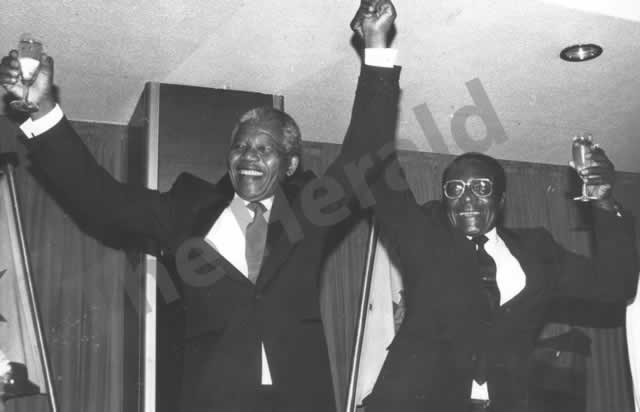Why the West Loves Mandela (and Hates Mugabe) President Mugabe gives a toast to a closer relationship between Zimbabweans and progressive South Africans
President Mugabe gives a toast to a closer relationship between Zimbabweans and progressive South Africans
and to peace and prosperity in 1990.By Stephen Gowans
December 09, 2013In the wake of Nelson Mandela’s death, hosannas continue to be sung to the former ANC leader and South African president from both the left, for his role in ending the institutional racism of apartheid, and from the right, for ostensibly the same reason. But the right’s embrace of Mandela as an anti-racist hero doesn’t ring true. Is there another reason establishment media and mainstream politicians are as Mandela-crazy as the left?
According to Doug Saunders, reporter for the unabashedly big business-promoting Canadian daily, The Globe and Mail, there is.
In a December 6 article, “From revolutionary to economic manager: Mandela’s lesson in change,” Saunders writes that Mandela’s “great accomplishment” was to protect the South African economy as a sphere for exploitation by the white property-owning minority and Western corporate and financial elite from the rank-and-file demands for economic justice of the movement he led.
Saunders doesn’t put it in quite these terms, hiding the sectional interests of bond holders, land owners, and foreign investors behind Mandela’s embrace of “sound” principles of economic management, but the meaning is the same.
Saunders quotes Alec Russell, a Financial Times writer who explains that under Mandela, the ANC “proved a reliable steward of sub-Sahara Africa’s largest economy, embracing orthodox fiscal and monetary policies…” That is, Mandela made sure that the flow of profits from South African mines and agriculture into the coffers of foreign investors and the white business elite wasn’t interrupted by the implementation of the ANC’s economic justice program, with its calls for nationalizing the mines and redistributing land.
Instead, Mandela dismissed calls for economic justice as a “culture of entitlement” of which South Africans needed to rid themselves. That he managed to persuade them to do so meant that the peaceful digestion of profits by those at the top could continue uninterrupted.
But it was not Mandela’s betrayal of the ANC’s economic program that Saunders thinks merits the right’s admiration, though the right certainly is grateful. Mandela’s genius, according to Saunders, was that he did it “without alienating his radical followers or creating a dangerous factional struggle within his movement.”
Thus, in Saunder’s view, Mandela was a special kind of leader: one who could use his enormous prestige and charisma to induce his followers to sacrifice their own interests for the greater good of the elite that had grown rich off their sweat, going so far as to acquiesce in the repudiation of their own economic program.
“Here is the crucial lesson of Mr. Mandela for modern politicians,” writes Saunders. “The principled successful leader is the one who betrays his party members for the larger interests of the nation. When one has to decide between the rank-and-file and the greater good, the party should never come first.”
For Saunders and most other mainstream journalists, “the larger interests of the nation” are the larger interests of banks, land owners, bond holders and share holders. This is the idea expressed in the old adage “What’s good for GM, is good for America.” Since mainstream media are large corporations, interlocked with other large corporations, and are dependent on still other large corporations for advertising revenue, the placing of an equal sign between corporate interests and the national interest comes quite naturally. Would we be shocked to discover that a mass-circulation newspaper owned by environmentalists (if such a thing existed) opposed fracking? (Journalists will rejoin, “I say what I like.” But as Michael Parenti once pointed out, journalists say what they like because their bosses like what they say.)
Predictably, Saunders ends his encomium to the party-betraying Mandela, the ‘good’ liberation hero, with a reference to the ‘bad’ south African liberation hero, Robert Mugabe. “One only needs look north to Zimbabwe to see what usually happens when revolutionaries” fail to follow Mandela’s economically conservative path, writes Saunders.
At one point, Mugabe’s predilection for orthodox fiscal and monetary policy was a strong as Mandela’s. Yet after almost a decade-and-a-half of the Western media demonizing Mugabe as an autocratic thug, it’s difficult to remember that he, too, was once the toast of Western capitals.
The West’s love affair with Mugabe came to an abrupt end when he rejected the Washington Consensus and embarked on a fast-track land reform program. Its disdain for him deepened when he launched an indigenization program to place majority control of the country’s mineral resources in the hands of black Zimbabweans.
Mugabe’s transition from ‘good’ liberation hero to ‘bad’, from saint to demon, coincided with his transition from “reliable steward” of Zimbabwe’s economy (that is, reliable steward of foreign investor and white colonial settler interests) to promoter of indigenous black economic interests.
That’s a transition Mandela never made. Had he, the elite of the imperialist world would not now be flocking to South Africa for Saint Mandela’s funeral, overflowing with fulsome eulogies.
http://gowans.wordpress.com/2013/12/09/why-the-west-loves-mandela-and-hates-mugabe/
